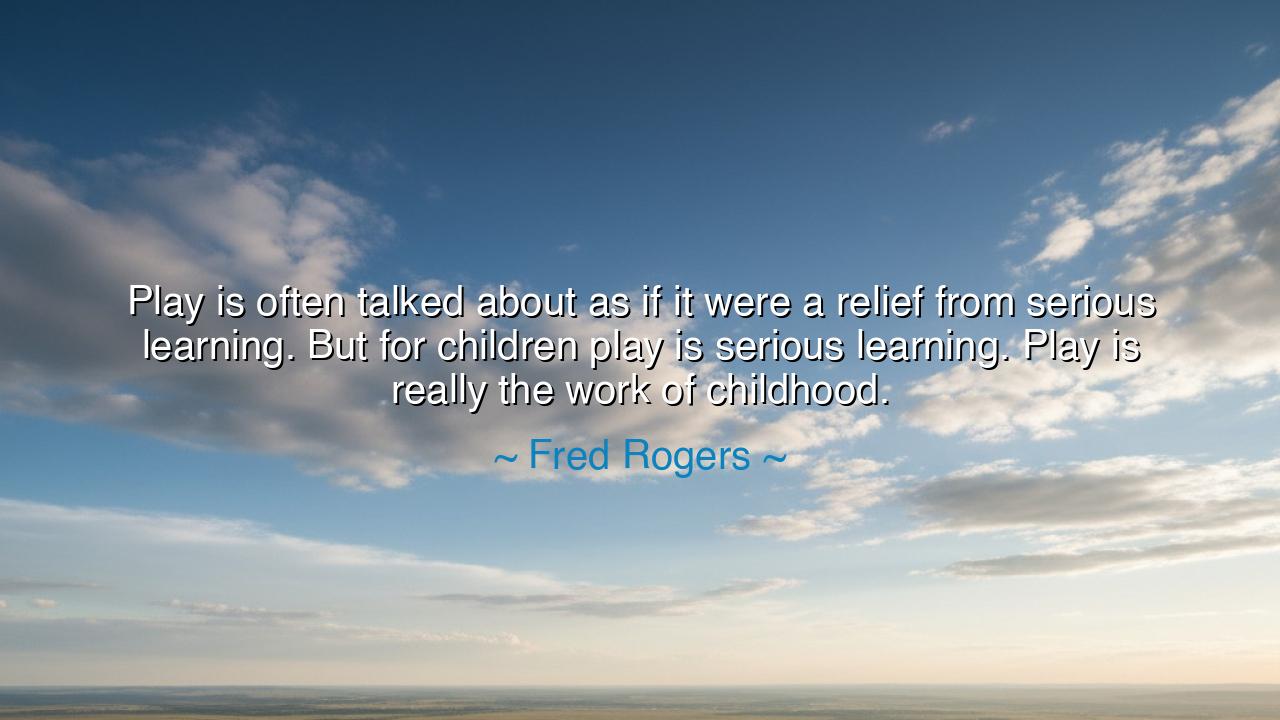
Play is often talked about as if it were a relief from serious
Play is often talked about as if it were a relief from serious learning. But for children play is serious learning. Play is really the work of childhood.






“Play is often talked about as if it were a relief from serious learning. But for children, play is serious learning. Play is really the work of childhood.” — so spoke Fred Rogers, the gentle sage of the modern age, whose voice carried kindness and whose wisdom flowed from compassion. In this simple but profound saying, he reveals a truth that the world too often forgets: that play is not a distraction from learning, but its very foundation — that in laughter, imagination, and curiosity, the seeds of understanding take root. Rogers, who spent his life guiding children through the landscape of emotion and wonder, saw what the hurried world overlooks — that through play, the child begins to learn how to live.
Fred Rogers, known to many as “Mister Rogers,” was not a philosopher in the marble halls of Athens, nor a teacher in grand academies. Yet his insight was no less deep than that of the ancients. He observed the smallest of miracles — the way a child builds a world out of blocks, or invents an entire story with a puppet — and in those moments, he saw the essence of human growth. To Rogers, play was not frivolous, but sacred. It was the child’s way of exploring truth, of testing limits, of transforming confusion into understanding. It was through play that children practiced the skills of the heart and mind — empathy, cooperation, creativity, and resilience.
The world, however, often makes the error of dividing life into “serious work” and “play.” Adults, hardened by ambition and routine, forget that their own wisdom once began in wonder. They treat play as leisure, as the opposite of productivity. But Rogers reminds us that for the child, play is the work — it is how the young mind builds its muscles of thought, how it learns to solve problems, how it experiments with failure and triumph. The ancient philosophers of Greece spoke of this too: Plato once said, “You can discover more about a person in an hour of play than in a year of conversation.” They understood that in the freedom of play, the soul reveals its truest nature.
Consider the story of Maria Montessori, the great educator who built her method upon this very principle. When others sought to fill children’s minds with rigid instruction, she watched them — truly watched them — and saw how they learned naturally through exploration. She discovered that when children were free to play with purpose — stacking shapes, arranging colors, imitating life — they taught themselves the laws of order, patience, and logic. Her classrooms became gardens of discovery, where play and learning were not divided, but united. Like Fred Rogers centuries later, she understood that play is learning made joyful.
In play, a child becomes both the scientist and the philosopher. The sandbox becomes the laboratory where gravity and cooperation are tested. The make-believe game becomes the stage where empathy and imagination are born. When a child pretends to be a hero, a teacher, or a parent, they are learning about courage, compassion, and responsibility. Through play, they begin to understand the great mystery of life — that knowledge is not merely to be memorized, but to be lived. And in this way, every child, in their own world of make-believe, is rehearsing for the real world that awaits.
Rogers’ words also carry a quiet warning: that when we dismiss play, we wound the roots of curiosity and joy. Too many children are hurried out of their natural rhythm, taught to measure their worth by grades and tasks, rather than wonder and discovery. The wise know that the greatest learning does not always happen in classrooms, but in fields, in playrooms, and in moments of laughter. It is through joyful engagement that the mind opens most fully, and through imagination that truth finds its first expression.
Therefore, my children, if you would raise the young — or nurture the child still within yourself — remember this: never underestimate the power of play. Give children the freedom to explore, to dream, to fail and to try again. Encourage curiosity more than conformity, creativity more than control. Watch them as Fred Rogers did, not with impatience, but with reverence. For when a child plays, they are not wasting time — they are building their world.
And so, let us learn from the teacher in the cardigan, the philosopher of kindness: “Play is the work of childhood.” Let us honor that sacred labor, for in the laughter of children and the light of imagination lies the foundation of all wisdom. In every game played, every story invented, every tower built and toppled and built again, humanity begins anew. Through play, the child learns life — and through the child’s play, the world remembers how to live.






AAdministratorAdministrator
Welcome, honored guests. Please leave a comment, we will respond soon